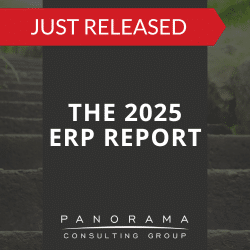Now that you’ve selected an ERP system, you need to decide on an ERP implementation approach. In other words, you need to determine if you’ll roll out the software in phases, all at once, or some combination thereof.
Today, we’re talking about the options you have and the questions you need to ask to make an informed decision about ERP implementation strategies.
What is an ERP Implementation Plan?
Typically, there are six stages in an ERP implementation project. These include:
- Planning
- Design
- Development
- Testing
- Deployment
- Support
Once you’ve navigated through the ERP selection process and have selected your ERP system, you’ve already entered the planning phase. It is at this stage that you will develop your ERP implementation plan. Part of this plan is deciding on a rollout strategy for go-live.
4 Types of ERP Implementation Strategies
1. Big Bang Implementation
A big bang implementation is a strategy in which the entire organization moves to the new ERP system in one single step. The main benefit of this strategy is that you can quickly begin taking advantage of the automation and efficiency benefits an ERP system can provide.
In order for a big bang implementation to be successful, you must have completed all testing and provided all training before the date on which the transition goes into effect.
A big bang implementation is a high-risk, high-reward strategy. There is always the risk of a system crash, so we recommend developing a contingency plan to minimize the impact on your workflows.
Ultimately, this approach is ideal for businesses that are only planning on using an ERP system for a few functional areas.
The 2025 ERP Report
72.6% of respondents said they've already deployed AI at their organizations. Learn about AI adoption and other ERP trends by downloading our latest report.
2. Phased Rollout
A phased rollout is a safer but more expensive approach to ERP implementation and generally takes several weeks or months. Phases can be based on a variety of factors, like business department or location.
Because the average ERP implementation time of the phased rollout is longer, the risks of failure are much lower.
The extra time means you can iron out kinks so that everything is operating optimally when the project is complete. It also means you can dedicate more time to optimizing usability and adoption. Your users will appreciate having more time to learn how to use your new ERP software.
3. Parallel Adoption
In a parallel adoption strategy, the organization uses its new ERP system in parallel with its legacy systems. This means that an organization could revert back to its legacy systems if anything goes wrong with the new ERP platform.
Parallel adoption is often considered the lowest-risk option, but it is also one of the most expensive strategies. Data needs to be entered into two systems simultaneously, thus, increasing the risk of duplication.
4. Hybrid Approach
The hybrid approach combines the above three approaches. You could roll out some ERP modules rapidly using a big bang strategy and then rely on a phased approach for the rest of the rollout. A parallel adoption could be added for mission-critical processes that your business relies on.
How to Choose the Right Strategy for You
Organizations have different needs, and there is no one-size fits all approach when it comes to ERP implementations. Questions you should ask yourself when deciding between these strategies include:
- How large is our implementation?
- What is our risk appetite?
- When do we hope to see a return on investment?
- What is our budget?
A big bang approach may be too risky if you are a large firm that is looking to implement several ERP modules at once. In contrast, a smaller organization with a healthy risk appetite may find a big bang approach ideal.
If you have room in your budget for it and you are okay with a delay before you see a return on your investment, a phased approach could be the best for you.
Still Unsure?
If you are still unsure which rollout plan is right for you, our ERP implementation consultants can help you assess your needs. We have experience developing implementation strategies for a variety of enterprise solutions, including ERP, CRM, SCM systems, and more. Contact us below for a free consultation.













